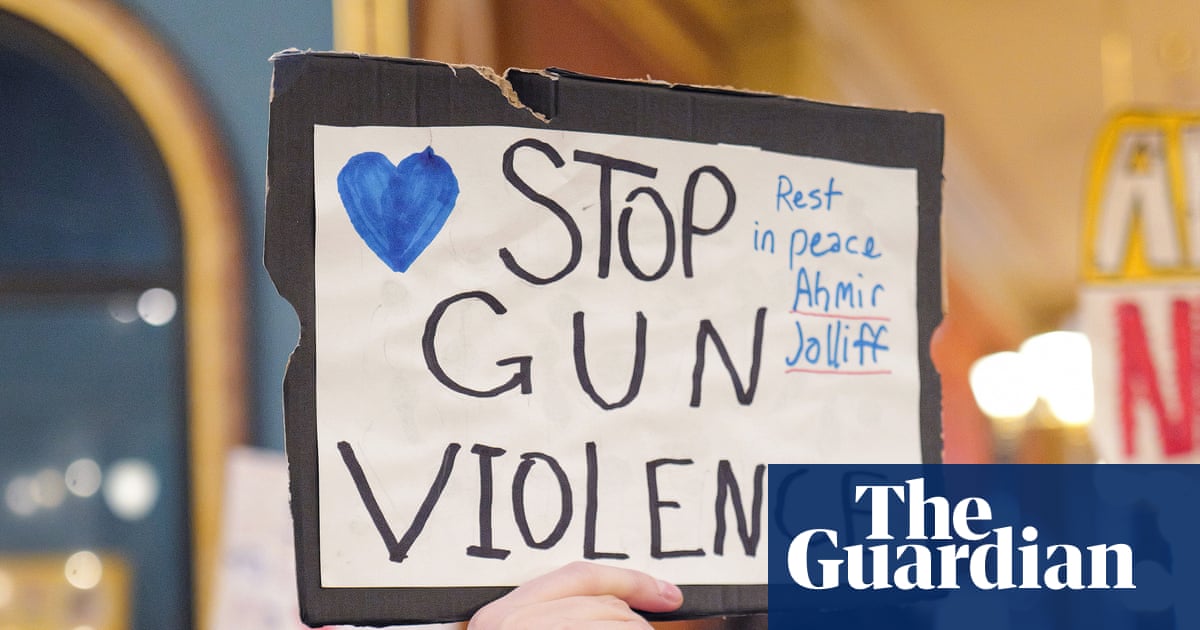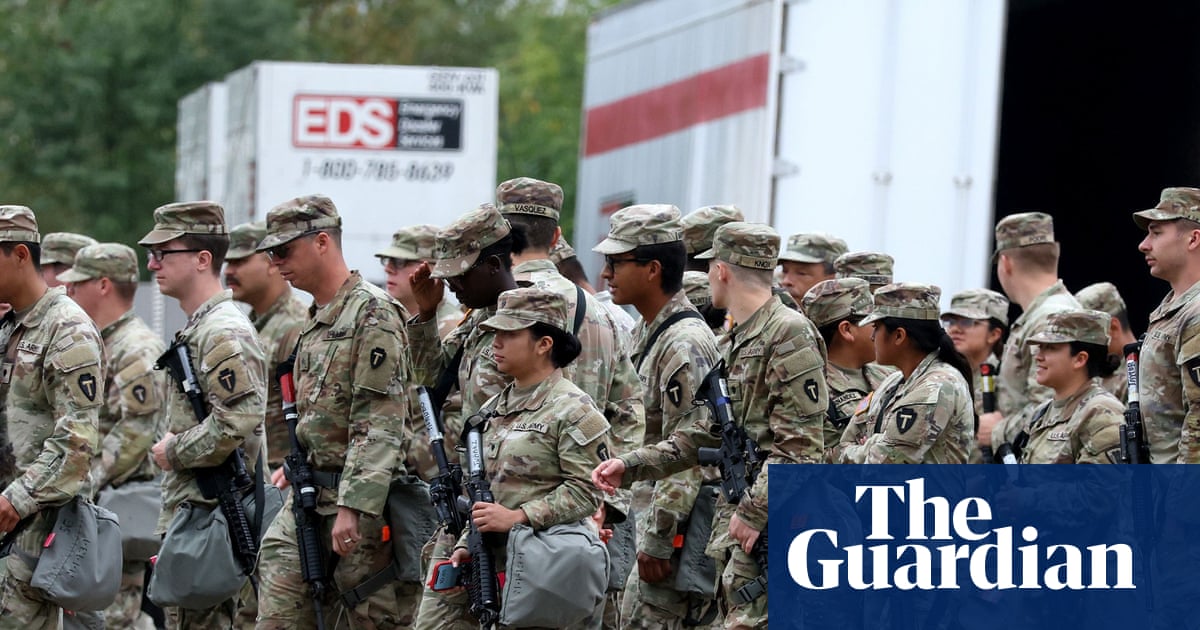At what point will the US’s top military brass decide that enough is enough, that loyalty to the constitution and the rule of law supersedes blind fealty to job and Donald Trump?
The question is hardly academic. The president has been rapidly intensifying military operations on United States soil during his second term. In April, he began expanding the military presence along parts of the US’s southern border by establishing so-called “national defense areas”. Troops are now authorized to search, question and detain people in those zones, dangerously muddling the line between military rule and civilian law enforcement.
By the summer, Trump sent in the marines and the national guard to Los Angeles, against the wishes of the governor, and later to Washington DC. Similar deployments of the national guard, also against the wishes of the respective state governors, are expected for Chicago and Portland, Oregon.
Needless to say, US law, under the Posse Comitatus Act, generally prohibits the use of the military in civilian law enforcement roles. A federal judge ruled in September that Trump’s troop deployment in Los Angeles violated the act, but Trump is doing it anyway. And he expects the military to follow him.
Not just follow him. He expects the military to venerate him. Trump turned a 250th Anniversary Parade for the Army, which we already didn’t need, into his own 79th birthday celebration, which we definitely didn’t need. (Both anniversaries were on the same day. Attendance at the parade was not only sparse, but was dwarfed by the estimated 5 million people who turned out for the “No Kings” demonstrations across the country on the same day.)
And most recently, he joined his recently renamed secretary of war, Pete Hegseth, in an abruptly summoned meeting of the country’s military commanders on 30 September. (“I love the name,” Trump said, referring to the Department of War. “I think it’s so great. I think it stops wars.”) At the meeting, Trump told the leadership: “We’re under invasion from within, no different than a foreign enemy, but more difficult in many ways because they don’t wear uniforms.” His evidence was that “Democrats run most of the cities that are in bad shape,” even though all the cities he listed – San Francisco, Chicago, New York, Los Angeles – have some of their lowest levels of violent crime in decades. And then he said: “We should use some of these dangerous cities as training grounds for our military.”
Trump and Hegseth are attempting to reshape the US military into a partisan force committed to preserving Trump’s power, a prospect which is not only anathema to our tradition but should also worry all Americans. And they want to make this restructuring into a spectacle. Everything Hegseth said at this highly publicized and very expensive meeting could have been issued by memorandum, and in fact was. But Hegseth in particular needs a rebrand. He is, at this point, much less known for leading military operations than he is for leaking them. For Hegseth, the very public lecture was a vainglorious attempt at buffing his own tarnished image. Unfortunately for him, it came across more like a condescending Ted talk that had possibly been directed by the ghost of Leni Riefenstahl.
But far more significant, and infinitely more troubling, was Trump’s foreshadowing of even greater numbers of troops on our American streets. So, I return to my initial question: when will the nation’s top military brass decide that enough is enough?
There’s every reason to believe that high ranking members of the military might already be worried about getting sacked by this president, either for being insufficiently loyal to Trump, insufficiently white, or insufficiently male, based on past actions from this administration. Within weeks of assuming office, Trump sacked the chairman of the joint chiefs of staff, Air Force Gen CQ Brown, only the second Black man to hold the position. Adm Lisa Franchetti, the first woman to be named to chief of naval operations, the US Navy’s highest rank, was also dismissed.
Trump also got rid of judge advocates general for the army, navy and air force, and fired Gen Tim Haugh, the head of the National Security Agency and US Cyber Command, reportedly at the request of far-right activist Laura Loomer, who claimed Haugh was insufficiently loyal to the president. There are many more examples.
While it’s true that every administration does some house cleaning upon assuming power, it’s also true that the scale and mission to restructure the military during this administration is unprecedented. As Peter Feaver and Heidi Urben write in Foreign Policy: “No previous administration exercised its power in this dramatic fashion for fear that doing so would effectively treat the senior officer corps as akin to partisan political appointees whose professional ethos is to come and go with changes of administration, rather than career public servants whose professional ethos is to serve regardless of changes in political leadership.”
Hegseth claimed that he will also now get rid of “stupid rules of engagement”. Those rules, however, define what is lawful and unlawful behavior by the military, a line made more difficult to discern as the administration decimates the legal wing (the judge advocate generals) of the military. Clearly, there has been plenty of illegality in the US military behavior from its inception until today. But if you are a member of the military, you have the right, if not the duty, to refuse illegal orders.
The Trump administration is currently engaged in blatantly illegal acts being carried out by the US navy. Lethal strikes are being launched against vessels in the Caribbean that the US claims are drug smuggling boats. No evidence has been provided, and now the administration is claiming the US is in a “non-international armed conflict” with drug cartels and the people who were murdered by the US in the strikes are “unlawful combatants”.
This is ludicrous, of course, and is reminiscent of the worst legal reasoning developed during the early War on Terror era. Even if the people on those boats were participating in drug smuggling (which is quite unlikely), being involved in the sale of a controlled substance does not rise to the standard of engaging in hostilities, as noted by Geoffrey Corn, a retired judge advocate general lawyer and formerly the army’s senior adviser for law-of-war issues.
When a state intentionally kills a person outside of armed conflict and without due process, it’s a form of murder. It’s already happening in the Caribbean Sea. Is that the path we’re headed down on the streets of our own cities? Trump may have drawn up his own battle plans for his purposes, but it’s the members of the military who will have to carry them out. With all our institutions currently on the line, including the military, we need a much stronger defense against his idea of war.
-
Moustafa Bayoumi is the author of the award-winning books How Does It Feel To Be a Problem?: Being Young and Arab in America and This Muslim American Life: Dispatches from the War on Terror. He is Professor of English at Brooklyn College, City University of New York

 German (DE)
German (DE)  English (US)
English (US)  Spanish (ES)
Spanish (ES)  French (FR)
French (FR)  Hindi (IN)
Hindi (IN)  Italian (IT)
Italian (IT)  Russian (RU)
Russian (RU)  3 weeks ago
3 weeks ago
























Comments